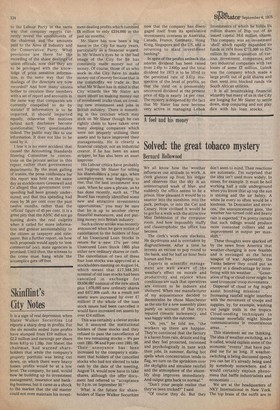Skinflint's City Notes
It is a sign of real depression when Slater Walker Securities Ltd reports a sharp drop in profits. For the six months ended June profits have slumped from £10 million to £2.2 million and earnings per share from 8.61p to 1.39p. Jim Slater, the chairman, had warned shareholders that while the company's property portfolio was being cut down, on which there were heavy losses, profits would be at a low level. The company, he said, would now be building up its investment management, insurance and banking business, but it came as a shock to the market that the old master could not even maintain his invest ment dealing profits which tumbled £6 million to only £234,000 in the past six months.
Mr Slater has now been a big name in the City for many years, particularly as a financial wizard. In Mr Wilson's eyes he is the bad image of the City for he has constantly made money out of money. Of course, those of us who work in the City have to make money out of money because that is the commodity we trade in. But what Mr Wilson has in mind is that City wizards like Mr Slater are more intent on making money out of investment tricks than on creating new investment and jobs in British industry. There is something in this criticism which may stick on Mr Slater though he can rightly claim to have taken over many sleeping companies which were not properly utilising their assets and to have improved their managements. He is clearly a financial catalyst, not an industrial creator. If he has been an asset stripper, he has also been an asset improver.
His Labour critics have probably not forgiven Mr Slater for telling his shareholders a year ago, when unemployment was beginning to rise, that the best investment was cash. When he uses a phrase, as he has done recently, such as, "The Board has recently identified some new and attractive investments opportunities," you may be sure that he is up to another clever financial manoeuvre, and not putting money into British industry.
Such a clever stroke was recently announced when he gave notice of cancellation to the holders of four of his Unsecured Loan Stocks in return for a new 171/4 per cent Unsecured Loan Stock 1995 plus either new ordinary shares or cash. The cancellation of two of these four loan stocks was approved at a stockholders meeting on August 14, which meant that £17,588,201 nominal of old loan stocks had been cancelled in exchange for £9,656,697 nominal of the new stock plus 1,076,095 new ordinary shares and £477,908 cash. As a result net assets were increased by over £7 million! If the whole of the loan stock issues had been cancelled it would have increased net assets by over £14 million.
This was certainly a clever stroke but it annoyed the institutional holders of these stocks and they refused to pass the cancellation of the two remaining stocks — 91/2 per cent 1991/96 and 9 per cent 1991/96. Their annoyance has been increased by the company's statement that holders of the cancelled stocks who had not elected to take cash by the date of the meeting, August 14, would now have to take shares, although the offer document had referred to "acceptance by 3 p.m. on September 30."
What is the future for shareholders of Slater Walker Securities now that the company has disengaged itself from its speculative investments overseas in Australia, Canada, France, Germany, Hong Kong, Singapore and the US, and is returning to staid investment banking?
In spite of the profits setback the interim dividend has been raised from 2.45p to 2.695p and the total dividend for 1975 is to be lifted to the permitted rate of 5.61p irrespective of the level of profits, so that the yield on a presumably uncovered dividend at the present price of 62p is nearly 14 per cent. The mystery is deepened by the fact that Mr Slater has now become very active in managing Lobok Investments of which he holds 51/2 million shares of 21/2p out of an issued capital 16.6 million shares. This company was an investment 'shell' which rapidly expanded its funds in 1974 from £771,000 to £21/2 million by the acquisition of various investment companies and two industrial companies with tax losses of some £2 million. Lubok was the company which made a large profit out of gold shares and then went into blocked rands via South African utilities.
It is all breathtaking financial wizardry but many of us in the City are longing for Mr Slater to settle down, stop conjuring and not play dice with his loan stocks.


































 Previous page
Previous page